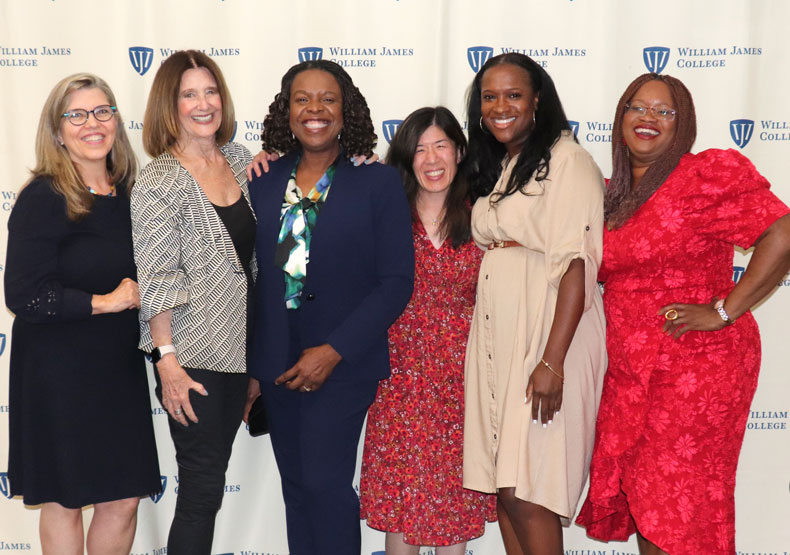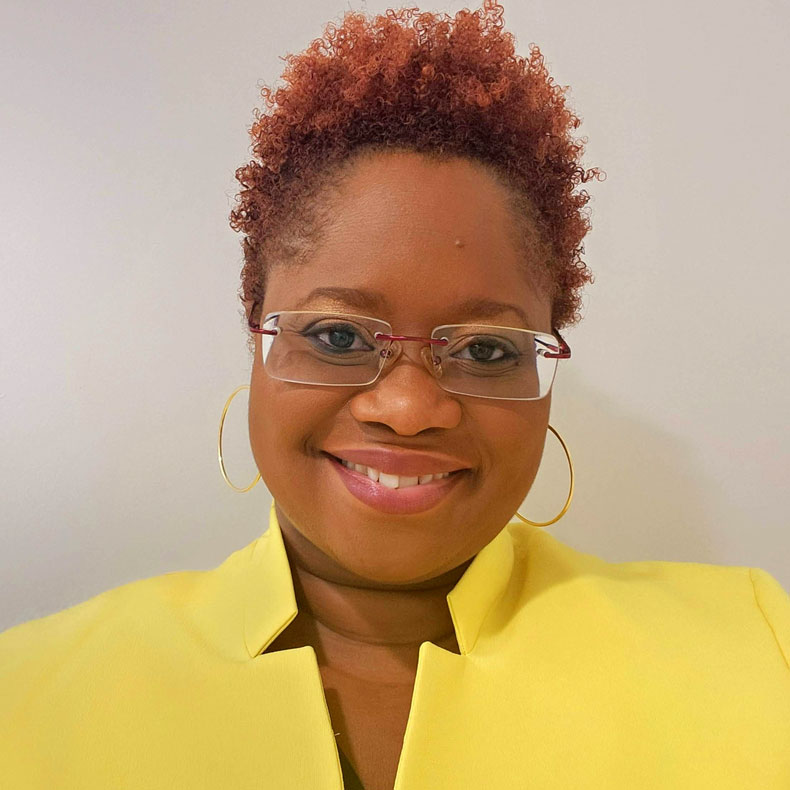New Director of The Center for Multicultural and Global Mental Health Leads its Restructuring to Meet Evolving Needs

(L to R) Dr. Mari Carmen Bennasar, Dr. Jill Bloom, Dr. Gemima St. Louis, Dr. Catherine Vuky, Dr. Shani Turner, and Dr. Natalie Cort

A dozen years ago Natalie Cort, PhD, was working as a federally-funded researcher—focusing on issues of culture in mental health—when she came across an article on the pioneering Latino Mental Health Program at William James College (one of just three in the country providing culturally focused training to Latino graduate students in the fields of psychology and mental health counseling at that time). The following year, after deciding to change careers and become a professor, Cort was happily surprised to see a familiar name turn up in her quest for a forward-thinking institution.
“As a researcher examining disparities impacting communities that have been historically minoritized and marginalized, the fact that William James College recognized the Latino population was the fastest growing racial-ethnic group in the country and was focusing on their mental health needs was exciting,” says Cort, underscoring a pervasive deficit in the field: The unique mental health challenges and areas of resilience among underserved populations are largely unknown to most clinicians being trained.
In 2015, two years following their respective arrival on campus, Cort and Gemima St. Louis, PhD, Vice President for Workforce Initiatives and Specialty Training joined forces in an effort to build upon the success of the very program that first piqued Cort’s interest in the College. This opportunity for talented experts, in partnership with each other, to develop innovative, paradigm shifting social justice-informed programs is a hallmark of President Nicholas A. Covino’s leadership style: When faculty members have an idea to address inequities, they are often allowed to pursue it with support from the College.
Cort and St. Louis had an intention that hinged on building upon the success of the LMHP to address the African and Caribbean community (from which both hail, Guyana and Haiti respectively); including immigrants and refugees in the conversation; and recruiting student leaders from underserved communities and providing them with mentorship opportunities.
In 2016, the Center for Multicultural and Global Mental Health (CMGMH)—of which, after three years serving as co-director, Cort is now Director—was inaugurated with groundbreaking programs, such as the Black Mental Health Graduate Academy and graduate-level academic concentrations in Latino Mental Health, African and Caribbean Mental Health (the nation’s first and only at that time); Asian Mental Health (the nation’s only); and Global Mental Health. Seventeen faculty members serve as course instructors, professional mentors, and service learning and cultural immersion directors in the Multicultural Center, which currently supports 137 students across its programs.
As to the colleagues’ mantra along the way?
“If you build it, they will come,” says Cort of a shared perspective (Biblical in origin and popularized by the 1989 film, Field of Dreams) that fueled her collaboration with St. Louis and ultimately Jill Betz Bloom, PhD, Director of the Global Mental Health Concentration—all of whom knew that communities of color cared about mental health, being healed, and being involved in healing.
“The absence of significantly notable numbers of People of Color enrolled in graduate programs wasn’t a consequence of lack of interest in being a part of the system, rather the system had not—in any way—communicated a desire for them to be a part of it,” says Cort, who hopes these programs not only communicate that William James College cares about these communities but also welcomes them to make their academic home in Newton.
In 2015, when this work began, just 7% of the student body identified as coming from BIPOC and other underrepresented populations (including racially and ethnically minoritized, economically and/or academically disadvantaged, and first-generation); this fall, 42% of the student body identifies as coming from an underrepresented background with the largest groups being racially/ethnically minoritized and first generation.
“To do this work, we need resources—especially when it comes to attracting students who have faced generational financial discrimination and lack of access,” says Cort, underscoring that, in 2015, the College was not eligible to apply for a federal Health Resources & Services Administration (HRSA) grant as the student body did not reflect America’s diversity and had insufficient numbers of students from underrepresented backgrounds. Five years later, the College received $6 million in HRSA funding (the only College in Massachusetts, among just two in New England, to receive the award in 2020) which not only enabled scholarships for disadvantaged students but also garnered recognition and awards from external organizations.
“New students from underrepresented backgrounds showed up immediately with the understanding that communities of color, and communities in desperate financial situations, are most burdened by mental health challenges,” says Cort, emphasizing that stress—from discrimination coupled with lack of access to resources, food, and opportunities—increases one’s exposure to mental health challenges.
“I remain grateful for the first group of pioneering students who showed up, did well, and opened pathways in terms of what's possible,” says Cort, underscoring that through their experience, the community at large has come to associate a diverse array of faces with excellence.
Among the myriad bits of advice gleaned along the way, Cort and her colleagues took one piece in particular to heart.
“We endeavored to make William James College the center of gravity for multicultural education in psychology and mental health counseling and succeeded,” says Cort who, second only to students, attributes the Center’s success to the dedication of its leaders:
Jill Bloom, PhD (Director, Global Mental Health Concentration) has been agitating for diversity—in largely White spaces, often on her own—long before the thought of a Multicultural Center on campus existed.
Shani Turner, PhD (Director, African and Caribbean Mental Health Concentration) brings dynamic leadership and powerful mentorship to students in the African and Caribbean Mental Health Concentration; she is an invaluable champion and an advocate.
Catherine Vuky, PhD (Director, Asian Mental Health Concentration) the only Vietnamese-speaking psychologist in all of Massachusetts and a powerhouse leader and mentor. The Asian Mental Health Concentration has grown exponentially due in large part to her generosity.
Mari Carmen Bennasar, PsyD (Director, Latino Mental Health Concentration) who has seen more than 130 students graduate from the LMHP since its inception, embraced me with warmth and enthusiasm upon my arrival. She communicated, We need you here; we want you here and continues to be the glue in our work.
Gemima St. Louis, PhD (Vice President for Workforce Initiatives and Specialty Training) is our guiding light—our joyful warrior—who consistently models how to make good trouble. She pours confidence and courage into all of us, empowering us with the tools to do this important work.
This fall, Cort was able to hire six professional mentors for the Black Mental Health Graduate Academy—five of whom are themselves former Academy Scholars. “To see them come back to pour into current students what was poured into them—and more—is everything joyous and good,” says Cort of this full-circle moment. The award-winning Academy, developed by Cort, has recruited and mentored 73 Black student leaders since its inception in 2016.
Under the leadership of a single Director for the first time since its inception, the Center for Multicultural & Global Mental Health is at a pivotal stage in its restructuring. As she takes stock of the big picture, and the disparate but connected programs that have worked well independently, Cort has her sights set on running the Center in a more holistic way.
“I'm proud of the diversity we've created, and now what is called for is institutional attention to ensuring equitable and inclusive practices,” says Cort, emphasizing the intention required to address the most challenging part of the DEI puzzle.
“Equity is about fairness, and making sure that we are providing equal opportunity to everybody who's in our space,” she says of an amazing growth opportunity—one Cort likens to the next hill on the horizon.
“I am honored to lead the Multicultural Center in this next chapter, which brings new students with new life experiences, challenges, and knowledge to share with us—and we must engage our collective strength to ensure our success as a community in the next eight years.”
- Tags:
- Around Campus
Topics/Tags
Follow William James College
Media Contact
- Katie O'Hare
- Senior Director of Marketing
- katie_ohare@williamjames.edu
- 617-564-9389
